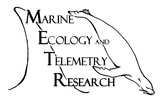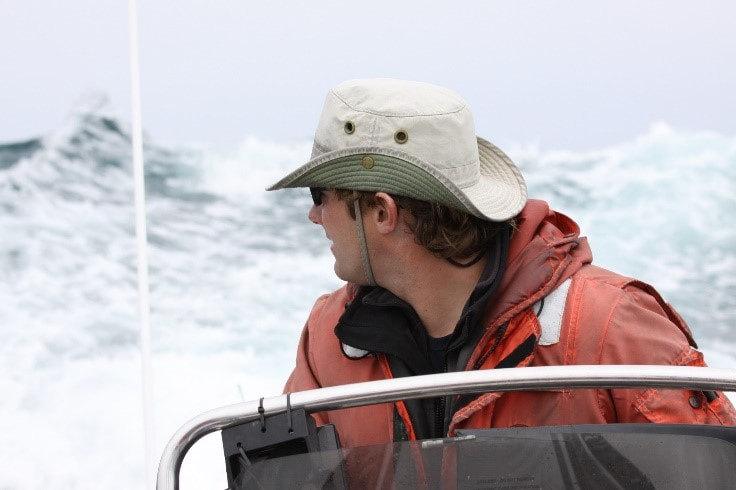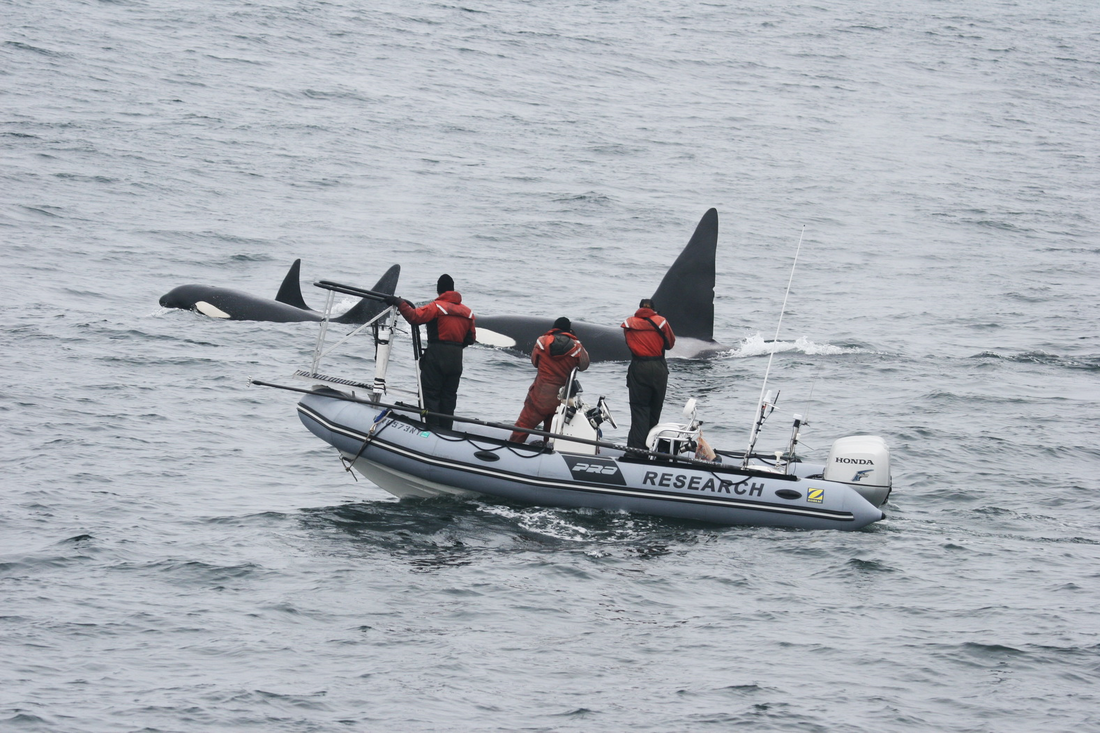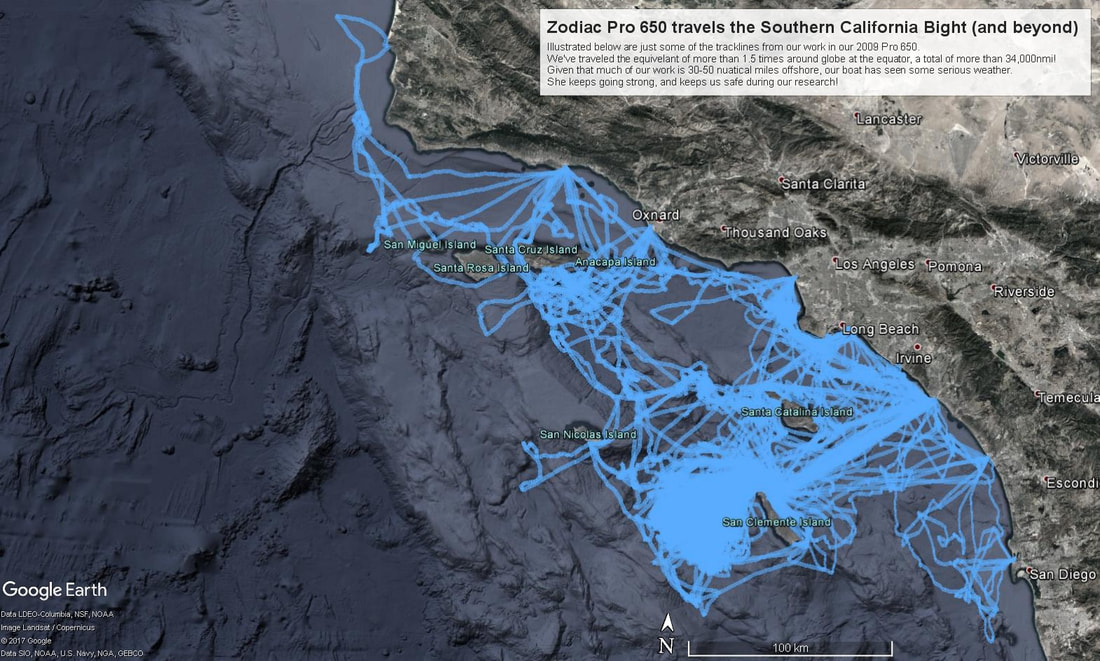|
Anyone who has spent a significant amount of time at sea will recognize the inherent risks of taking a small inflatable boat 40 to 50 miles offshore on a routine basis. Where we operate, there is no protection from the ocean swells, and no large support vessel to pluck us out of the water when the weather picks up. It is rare for us to be operating in conjunction with other vessels, meaning we are out there on our own. Training, experience, and good judgement are key factors in mitigating risks of operating far offshore. Having the right equipment is also critically important. In this blog, we will highlight our current workhorse of a boat, the R/V Physalus, and introduce the carefully chosen, newest member of the fleet, the R/V Phoenix. R/V Physalus (the species name for the fin whale) is a 2009 Zodiac Pro 650, manufactured in North Carolina by Zodiac North America. She is part of a class of boats known as a Rigid Hull Inflatable Boat (RHIB), meaning a fiberglass hull with inflatable tubes surrounding it. RHIBs are inherently stable boats (when operated appropriately), and substantially lighter than a traditional hull of similar size. This results in significantly improved fuel economy—important given our average day at sea covers more than 100 nautical miles (maximum of ~175), and fuel capacity is limited. Twin 75 horsepower Honda outboards power Physalus, so we have enough juice to keep us out of trouble should one engine go down. In the 8 years we have been operating Physalus, we have logged more than 3,000 hours on the water and covered more than 34,600 nautical miles (>40,000 miles or 63,000 kilometers)—that’s the equivalent of having traveled around the globe at the equator more than 1.5 times! During that time, the boat has seen her share of rough weather, including one transit that ended up cracking the hull of a 60’ charter boat that we were working with at the time. Yet, Physalus remained sound and handled the seas with the confidence of the best rough weather boat. In all our time in Physalus, we’ve only had to do minor repairs to the inflatable tubes, and no repairs to the fiberglass hull, despite the tremendous stress put on it. While Physalus will remain our principle research platform, her lack of deck space to accommodate three people in addition to all our research gear, as well as the need for two simultaneous boats for some projects, has led us to investigate adding a second boat to our fleet.
Given our humble origins (in other words, a new-start, small non-profit with no real fundraising mechanism), we initially looked only at used boats. However, our needs in terms of how the boat is configured are pretty specific, and any used boat of sufficient quality we found would have needed costly modifications. We also kept revisiting the fact that Physalus has been a perfect boat for us and we have absolute faith in her abilities to do the job safely. We decided to reach out to Zodiac North America, and in particular, the dealer Inflatable Boat Specialists in Ventura, CA from whom we had purchased Physalus. We sent them a short blurb about our new organization, accomplishments, and history with Physalus, and asked if there was any way they could help support our work. Inflatable Boat Specialists responded immediately and helped us secure a brand new Zodiac Pro 750 with twin 115hp Yamaha outboards at a price point that fit our budget. This new boat, which we have named the R/V Phoenix, is longer and wider than Physalus, providing us with the additional internal space we need for projects which require three personnel on board and/or more research gear. We are spending the next week in California taking delivery of the boat, running sea trials/breaking in the engines, and outfitting her with the electronics, safety equipment, bow pulpit, and other gear we need to have her ready to go to work on our next field effort in November. We’ll post pictures of our new boat in the next few days, but wanted to share the exciting news! Now we just need to find a dealer or generous person(s) to help us obtain a truck to tow the boat! Guess we put the cart before the horse, but that’s always been our style. In the meantime, we’ll continue to rely on the fantastic support of Frank and Jane Falcone, and borrow their truck.
3 Comments
10/17/2017 17:21:51
Marine ecology is so broad and discoveries in this field is still ongoing. I love science because it is a study where we discover new things in life. A branch of science where we can solve problems in life and we can also make our world better. I also wish that there are people who will study more about it. This is a new generation of hope to the future.
Reply
I really want to experience this kind of research. Marine Ecology and Telemetry Research are far different in what I always do as a communication researcher. Though we have different fields, I also feel how hard to do the process of research. Especially when it comes to data gathering, we, as researchers, should exert more efforts in collecting information and data. The tools that we need to have should always be updated. I hope that someday, I can also explore and travel different places and at the same time do some research.
Reply
Leave a Reply. |
AuthorClick here to learn about our research staff. Archives
August 2022
Categories |




 RSS Feed
RSS Feed